Friday, February 3, 2012
1935-36 Detroit Red Wings Syd Howe Jersey
Syd Howe began his NHL career with the Ottawa Senators in 1929, playing in 14 games that first season.
Howe with the Senators
He was unfortunate to be loaned to the ill-fated Philadelphia Quakers in his second season, as the franchise, which was in dire financial difficulties, had just relocated from Pittsburgh. The move to Philadelphia did nothing to solve the club's problems and they went 4-36-4 to set an NHL record for futility. In their 44 games, they scored just 76 goals, of which Howe had 9, or 12%.
Howe during his season with the Quakers
The Quakers folded after the season and Howe found himself with the Syracuse Stars of the IHL for the 1931-32 season as well as making three appearances for the Toronto Maple Leafs when Ottawa, who still held his rights, failed to field a team due to their financial struggles.
Howe during his brief time with the Maple Leafs
For the 1932-33 season, Howe was back with the Senators, with whom he set a new career high for goals and points, with 12 goals and 24 points. The following season he raised his goal total to 13 in what would prove to be the Senators final season in Ottawa after once being the dominant club in all of hockey, which included seven Stanley Cups.
Howe remained with the relocated franchise, now based in St. Louis and known as the Eagles. There, Howe edged his career best marks to 14 goals and 27 points in 36 games before being traded to the Detroit Red Wings, where he would play 14 additional games, scoring 8 goals and 20 points to push his final season marks to 22 goals and 47 points.
The St. Louis Eagles Syd Howe
The move to Detroit finally gave Howe's career some much needed stability, as he would remain with the Red Wings for 12 seasons. The move would also provide him with success, as during Howe's second season with Detroit in 1935-36, they would capture the first Stanley Cup of his career following a three game sweep of the Montreal Maroons (which included the longest game in NHL history, the six overtime Game 1) before defeating the Maple Leafs 3 games to 1. Detroit would repeat as champions in 1937, this time defeating the Montreal Canadiens and New York Rangers, both in the full five games.
The 1937 Stanley Cup Champion Detroit Red Wings
In the 1940-41 season, Howe would raise his career best goal total to 20, as well as adding another 24 assists for 44 points, only his second season over 40. He would equal his 20 goal mark two seasons later, while adding 35 assists for a new career best of 55 points as the Red Wings once again captured the Stanley Cup following a sweep in the finals over the Boston Bruins, the third of Howe's career.
Howe then set career best marks in goals and points, as he tallied 32 goals, his only season over 30, on his way to the only 60 point season of his career with exactly 60.
Three of Howe's goals that season came in a record setting game against the Rangers when he scored a hat trick during the final six minutes of a 15-0 Red Wings win over New York on January 23, 1944, which remains the largest margin of victory ever in an NHL game.
His goal total that season also included a stellar six goal performance on this date in 1944 in a 12-2 win over the very same Rangers. Howe scored a pair of goals in each of the three periods to become the first player to score six goals in a game since Cy Denneny scored six in 1921, a span of 23 years. In the nearly 70 years since, only two other players have matched his feat, Red Berenson in 1968 and Darryl Sittler in 1976, while no one has topped it.
Howe's six goals delighted the crowd of 12,293 at the Olympia Stadium, which included 900 school patrol boys, who cheered wildly at the end of the night as Howe was carried off the ice on the shoulders of his teammates. "They were going in the net tonight. Another night they don't," said Howe. "I don't remember any goal in particular. he boys were feeding them to me nicely." When asked how he was going to celebrate, he replied "No celebration for me. I'm due at work at 7:10 AM," as amazingly, Howe played for the Red Wings at night, but worked as a machinist for Ford during the day!
Howe being carried off the ice on the shoulders of his teammates following his six goal night. Note the "V" patches worn on the Red Wings arms during World War II.
The following season of 1944-45 saw him score 17 goal, more in line with his career average, but by setting a career high with assists with 36, he had his third 50 point season with 53.
His final season saw Howe splay 26 games for the Red Wings, scoring 4 goals and 11 points to put his final career totals at 237 goals and 291 assists for 528 points, making him the NHL career scoring leader at the time despite never having won the scoring title.
Howe also played 14 games for the Indianapolis Capitals of the AHL that season and finished out his playing days with a season in the Quebec Senior Hockey League, playing for a club named the Ottawa Senators, brining his career full circle, as he broke into the NHL in Ottawa with a club also named the Senators.
In 1965 Howe was inducted into the Hockey Hall of Fame.
Of note, Gordie Howe arrived in Detroit the year after Syd left the team, setting records for longevity while scoring at a high rate, giving fans in Detroit a Howe to cheer for from 1934 to 1971 - 37 seasons in all.
Gordie and Syd Howe
Today's featured jersey is a 1935-36 Detroit Red Wings Syd Howe jersey. from the season Howe won his first of three Stanley Cups with Detroit. When the NHL expanded to Detroit in 1926, the club was named the Cougars in honor of the Victoria Cougars, the PCHL club that supplied Detroit it's original roster when the PCHL folded.
In 1930 the club changed it's name to the Falcons for two seasons prior to being named the Red Wings in 1932 following a change in ownership to James Norris. The team adopted the winged wheel logo and their iconic red sweaters have remained essentially unchanged ever since. The original red numbers outlined in white lasted until 1937 when they changed to a more legible single color white.
Names were added by league rule in 1977, later becoming arched in 1982 following a one year change in the font for the numbers. 1983 saw a return to the standard block font for the numbers, along with raising the white waist stripe up a few inches from the hem to mirror the white jerseys, only to return to it's original location at the bottom of the jersey in 1986.
Today's video selection is a look back at the Detroit Olympia, the long time Red Wings home and site of Howe's six goal game.
Labels:
Detroit Red Wings,
Howe Syd
Subscribe to:
Post Comments (Atom)

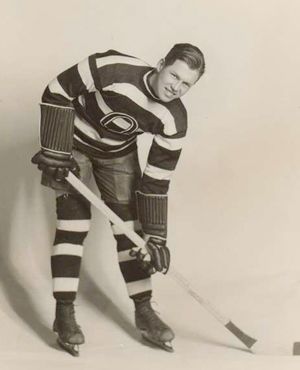
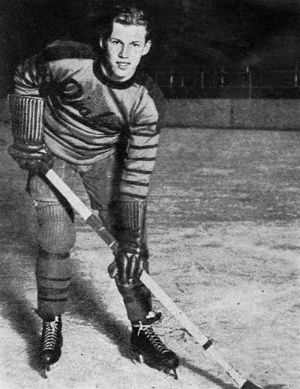
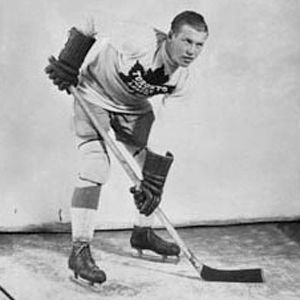
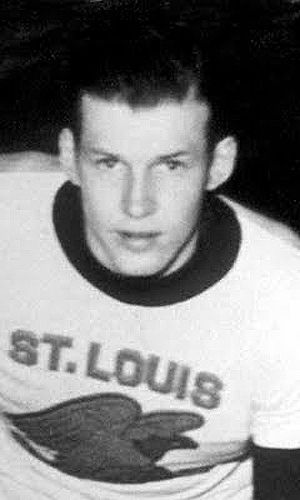
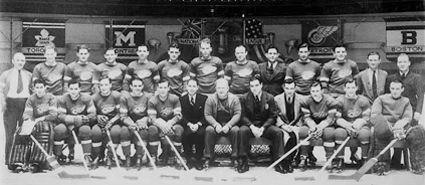
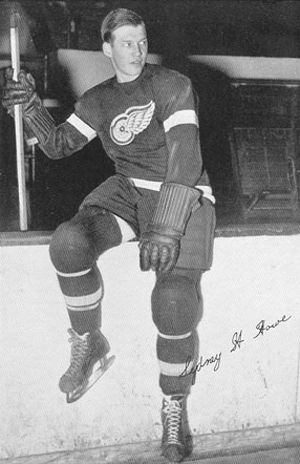
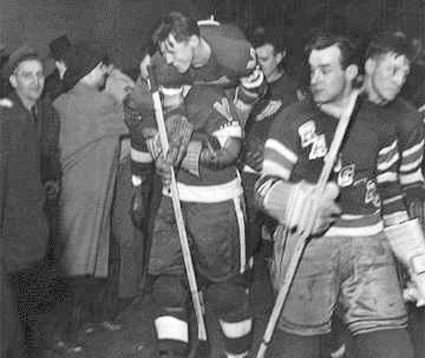
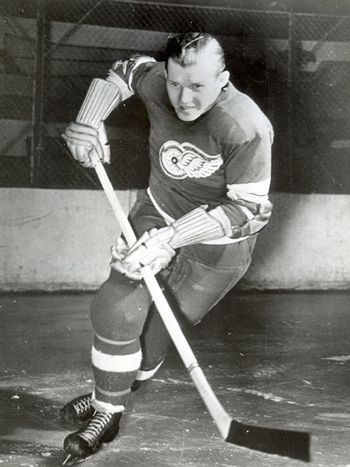
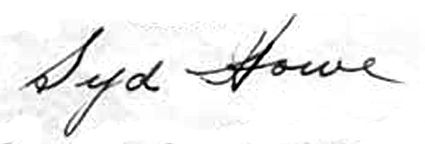
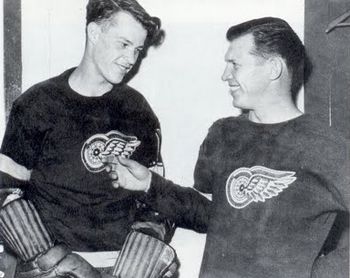
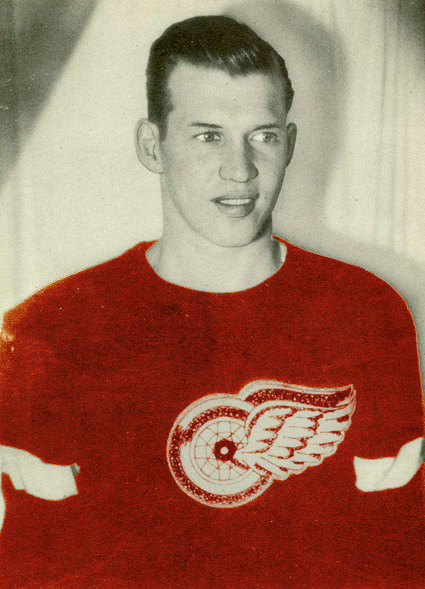










Man, some FANTASTIC photos with this post. Great job!
ReplyDelete